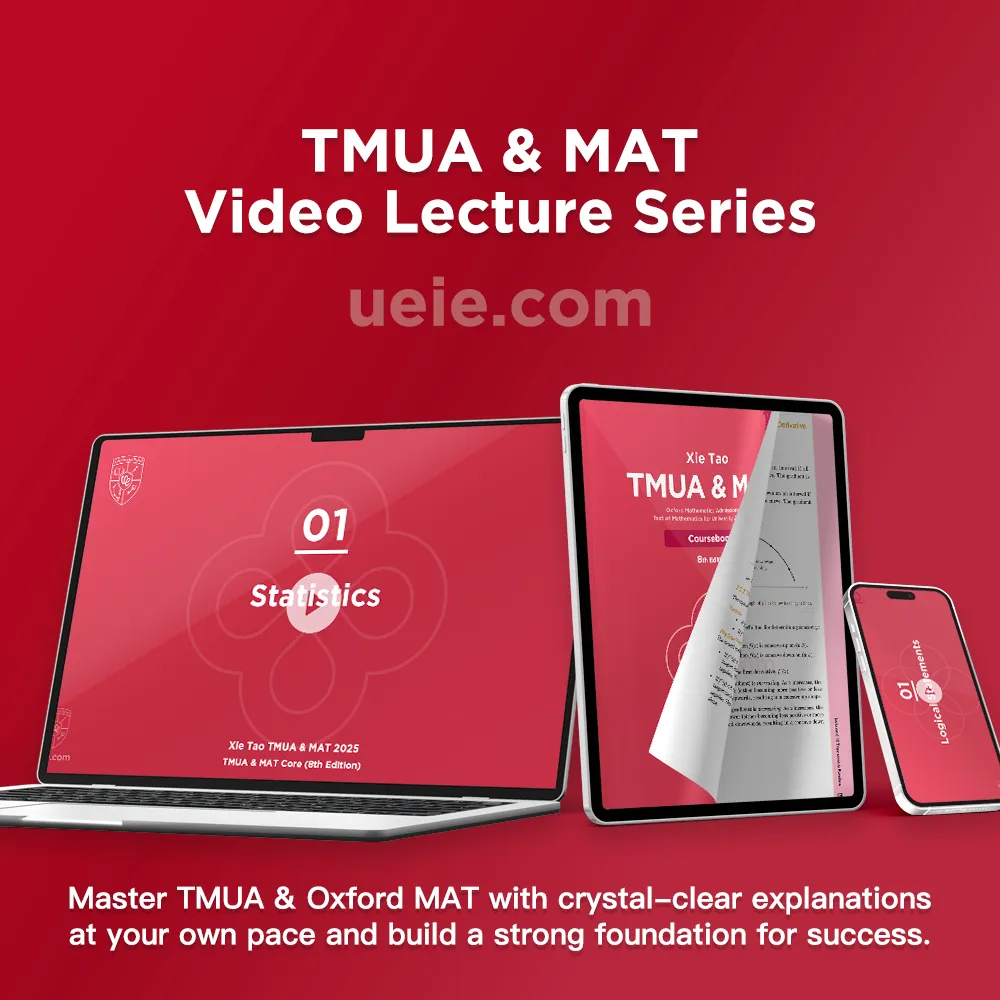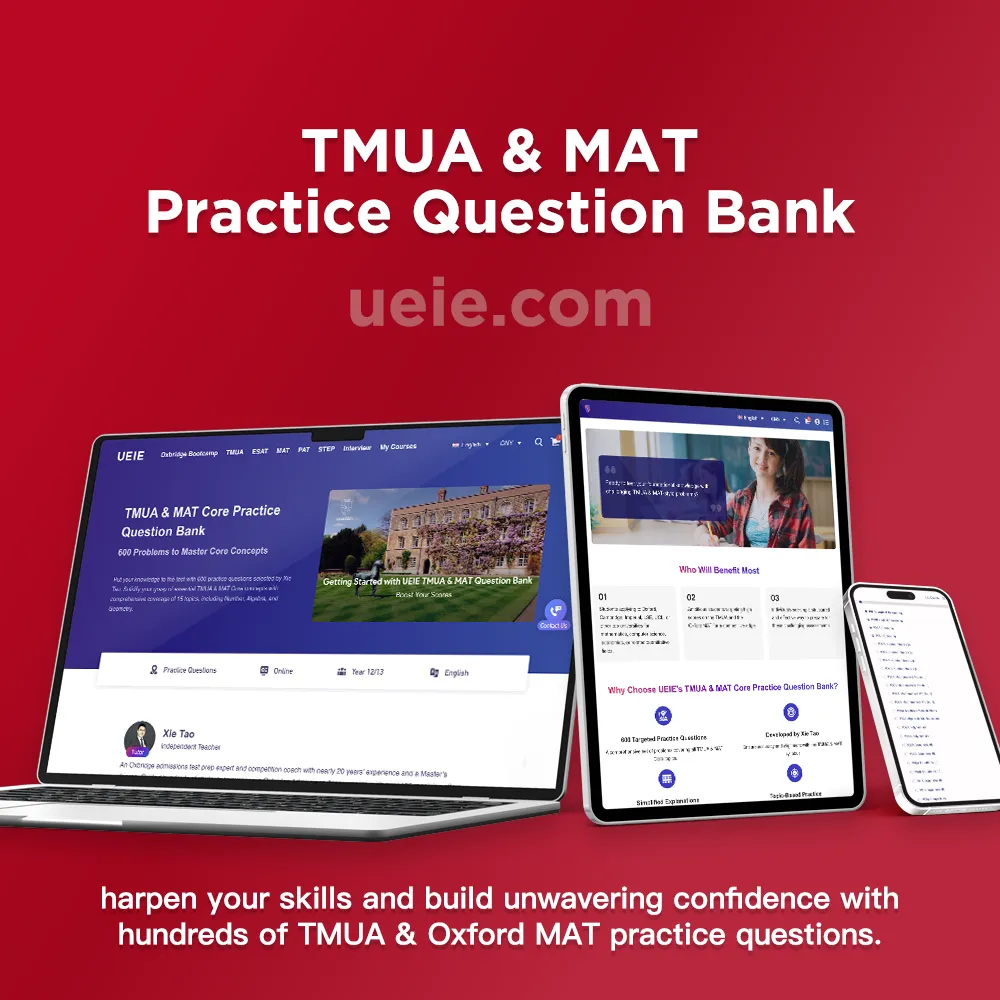Master the Oxford MAT: Strategies for Unique Problems & Online Format

Independent Teacher
Master the Oxford MAT: Strategies for Unique Problems & Online Format

During the process of preparing for the Oxford MAT, many students may feel bewildered: How can one effectively enhance their ability to tackle the unique question types of the MAT? What is the most efficient way to plan for Oxford MAT preparation? And how should one adapt to the new format of online computer-based testing?
It is hoped that this Oxford MAT Preparation Guide, which encapsulates my (Mr. Xie Tao) many years of experience in coaching for Oxbridge written examinations, can answer these questions for you, whilst also providing a systematic and practical set of preparation strategies, methods, and suggestions.
Before delving into this article, it is strongly recommended that you first familiarise yourself with the latest developments, fundamental requirements, and marking details of the examination by consulting my most recently revised Oxford MAT Comprehensive Guide.
I. Setting Objectives and Adjusting Mindset for Oxford MAT Preparation
To embark on your Oxford MAT preparation journey, you must first clearly define your ‘destination’ and your ‘starting point.’ Scientific objective-setting and positive psychological preparation will lay a solid foundation for your subsequent systematic study.
1. Clarify Objective Requirements
You need to clearly understand the University of Oxford’s expectations regarding MAT scores. Although MAT does not have a fixed “pass mark,” its score is one of the key factors influencing interview shortlisting.
First, meticulously consult Oxford’s official website. Check the latest 2026 admissions requirements for your chosen course.
Secondly, you can refer to Part V, MAT Marking Scheme and Score Interpretation, of my most recently revised Oxford MAT Comprehensive Guide, to understand the approximate competitiveness of different score bands. For instance, knowing the average MAT score of candidates who received interview invitations or final offers (e.g., for 2024 entry to Oxford mathematics-related courses, the average score of admitted students was approximately 77.4 points) will help you comprehend the “level” of your target score.
2. Conduct a Preliminary Self-Assessment
Before formally commencing systematic preparation, undertaking a Diagnostic Exam (a ‘baseline assessment’) is crucial. This will help you to:
- Experience the Difficulty and Format: Personally experience the style, thinking requirements, and online examination environment of MAT questions (particularly the multiple-choice and short-answer questions under the new format).
- Understand Your Current Standing: Preliminarily assess your current mathematical proficiency and core competencies in relation to the MAT’s requirements.
3. How to Conduct a Diagnostic Exam?
Choosing Assessment Tools
Although the 2024 MAT reforms have led to significant changes in question types, the scores from mock examinations using official MAT past papers from earlier years (e.g., three years prior) can still serve as a reference to some extent.
A more recommended approach: To help you conduct a more precise and comprehensive self-assessment, I (Mr. Xie Tao), based on many years of research into the MAT examination, have developed a specialised Free Oxford MAT Diagnostic Exam (online computer-based). This examination highly simulates the latest MAT paper format and difficulty, aiming to more effectively assess the core knowledge and abilities required for the MAT. Click the link below to learn more about this Diagnostic Exam and attempt it online.

Free Oxford MAT Diagnostic Exam
Suggested Operational Steps
- Environment: Regardless of the paper used, strictly simulate the real examination environment (online computer-based or a quiet paper-based setting) and complete it independently.
- Timing: Strictly adhere to the 150-minute time limit.
- Marking: Refer to the official marking scheme or the provided reference answers and marking suggestions for the Diagnostic Exam for an objective assessment.
- Interpretation of Results: The baseline score is merely a starting point, intended to identify gaps rather than predict the final outcome. What is important is to analyse the reasons for errors and identify areas of weakness. Retain your answer script and analysis for subsequent progress tracking.
4. Setting Scientific MAT Score Objectives
Combining your objective requirements and self-assessment results, you need to set a scientific and reasonable preparation objective. It is advisable to follow the SMART principles:
- Specific: Clearly define the score range you aim to achieve (e.g., target 75 points or above, or strive for 80 points).
- Measurable: The objective should be quantifiable through subsequent mock test scores.
- Achievable: Based on your starting point, available time, and level of effort, the objective should be attainable, avoiding unrealistic expectations.
- Relevant: The objective should be closely related to your ultimate goal of applying to the University of Oxford.
- Time-bound: Clearly define the timeline for achieving the objective (i.e., the official examination date).
Balancing Ambition and Reality
Objectives should be challenging enough to stimulate potential but also realistic. For instance, if your aim is to secure an interview invitation, setting a target in the 70-75 point range might be more practicable than directly aiming for 90 points (this depends on individual circumstances). Dynamic adjustment of objectives based on preparation progress is also necessary.
5. Adjusting Mindset: Embracing the MAT Preparation Challenge
Oxford MAT preparation is no easy feat; it tests not only mathematical knowledge but also mental resilience and problem-solving abilities. It is imperative to cultivate the following mindset:
- Confront Challenges Head-on: Recognise the depth and novelty of MAT questions, viewing them as opportunities to enhance your thinking skills.
- Accept Setbacks: Encountering difficult problems and performing poorly in mock examinations are normal. The key is to analyse the reasons and learn from them, rather than engaging in self-denial.
- Focus on the Process: Concentrate on understanding concepts, improving abilities, and mastering methods; enjoy the process of problem-solving.
- Maintain Patience and Perseverance: Improving MAT abilities takes time and sustained effort; trust in the power of accumulation.
II. Knowledge Base Required for Oxford MAT Preparation
‘Know thyself and know thy enemy, and you will never be defeated.’ Accurately grasping the knowledge requirements of the MAT is the first step in formulating an effective preparation strategy.
1. Scope of Knowledge in the MAT Syllabus: Seemingly Basic, Yet Profound
Core Content: The MAT syllabus is primarily based on the Pure Mathematics component of A-Level Mathematics (excluding Further Mathematics). This means that, from a list of topics, it might appear ‘narrower’ than you imagine.
Depth Challenge: However, do not be deceived by the syllabus’s conciseness! The MAT is not designed to test simple recall of knowledge points. Instead, it uses this relatively basic knowledge as a vehicle to delve deeply into your mathematical understanding, the rigour of your logical reasoning, and your ability to solve problems in novel contexts. This demands a profound understanding and flexible application of the topics covered in the syllabus.
2. A-Level Further Mathematics: An Added Bonus, Beneficial in the Long Run
The MAT syllabus does not include A-Level Further Mathematics content, and solving MAT questions does not require knowledge of Further Mathematics. This is to ensure fairness to students who have not studied Further Mathematics.
Nevertheless, I still recommend that students with the capacity to do so study Further Mathematics. This is because it can:
- Elevate Thinking Levels: Significantly broaden mathematical horizons, deepen understanding of abstract concepts, and cultivate higher-order mathematical thinking skills, which are extremely helpful for solving challenging MAT problems.
- Lay the Groundwork for Subsequent Stages: A background in Further Mathematics is almost an ‘implicit requirement’ for Oxford interviews and is an essential foundation for university-level study in mathematics or computer science.
3. Mathematical Competitions: Shared Thinking, Added Experience
Stylistic Correlation: In recent years, MAT questions, in terms of problem design and solution approaches, indeed share similarities with many mathematical competition problems, particularly in their assessment of logical reasoning, number theory fundamentals, combinatorial thinking, and recursive methods.
The Value of Experience: Consequently, students with training backgrounds in relevant mathematical competitions (such as BMO, AIME, etc.) may find it easier to identify solution paths for some MAT questions, giving them a certain advantage.
Not a Mandatory Prerequisite: However, please note that competitions are by no means a prerequisite. The core of the MAT remains the flexible application of knowledge within the syllabus. For students without a competition background, the focus of preparation should be on thoroughly understanding the syllabus and enhancing core abilities. Simultaneously, consciously engaging with some basic competition-style problems during preparation can help broaden perspectives and improve problem-solving flexibility.
4. Bridging Different Curricular Systems: Identifying Gaps, Adjusting Focus
For students studying under non-A-Level systems such as AP or IB, a dual bridging of knowledge and abilities is necessary:
Knowledge Level
- AP Students: Calculus knowledge (especially BC) is well-covered, but in other A-Level specific topics or areas with different emphasis, such as algebra, coordinate geometry, and trigonometry, a careful check against the MAT syllabus and supplementary study are required.
- IB Students: While HL Mathematics (AA/AI) content is broad, there are differences in the depth of certain specific topics (e.g., some proof techniques, number theory fundamentals) and the intensity of training in basic computational skills compared to MAT requirements.
Ability Level
- Computational Skills: Regardless of the system, it is necessary to strengthen mental arithmetic and written calculation speed and accuracy in a non-calculator environment.
- Thinking Style: Adapt to the MAT’s unique problem style, which emphasises deep thinking, logical rigour, and creativity.
III. Core Competencies Essential for High MAT Scores
Mastering the knowledge required for the MAT is fundamental, but to excel in the examination, it is also necessary to hone the following core mathematical competencies, which are highly relevant to its unique assessment methods (especially the combination of online multiple-choice and short-answer questions).
1. Precise and Efficient Computational Ability
- Core Requirement: Calculators are not permitted at any point during the MAT. This places extremely high demands on computational ability – not only accuracy but also rapid completion within limited time. Precise calculation is the foundation for scoring, whether for quick solutions in multiple-choice questions or step-by-step derivations in short-answer questions.
- Common Challenge: Particularly for students from international curricula (A-Level/AP/IB) accustomed to relying on calculators, the speed and accuracy of basic computation are often weaknesses. In the MAT, any calculation error can directly lead to lost marks (especially as there are no partial marks for working in multiple-choice questions).
- Key Improvement Points: Specific training is essential to reinforce mental and written arithmetic techniques. Proficiency in common algebraic manipulations, function evaluation, calculus operations, etc., should be developed to the point of ‘reflex action.’ It is imperative to cultivate the habit of careful checking and verification.
2. Rigorous and Profound Logical Reasoning
- Core Requirement: The MAT places extreme importance on logical rigour. You need to be able to accurately understand the question, grasp the premises, carry out watertight reasoning, and clearly construct a chain of argument. This is evident not only in the proofs for short-answer questions but also throughout the analysis and elimination process for multiple-choice questions.
- Common Challenge: Many students lack systematic logical training and are prone to skipping steps in reasoning, confusing concepts, or failing to consider all cases (e.g., omitting scenarios in case-by-case analysis).
- Key Improvement Points: A thorough command of basic proof methods (direct proof, proof by contradiction, induction, etc.) and the precise meaning of logical connectives is required. Consciously train the rigour of your thinking, ensuring every step of a derivation is well-founded. Engage in more logical discrimination and ‘fault-finding’ exercises to enhance logical sensitivity.
3. Flexibility, Adaptability, and Problem-Solving
- Core Requirement: The charm and difficulty of the MAT often lie in its requirement to apply familiar knowledge to novel and unfamiliar situations. You need the ability to quickly understand the essence of a problem, break free from fixed mindsets, flexibly choose and combine methods, and think about problems from different angles.
- Common Challenge: Students often get stuck when faced with unseen question types or phrasing, or they can only solve problems using fixed ‘routines.’
- Key Improvement Points: When solving problems, do not be satisfied with finding just one solution; consider whether there are better or different solutions. Summarise the core idea and key breakthrough points of the problem. Focus on analysing the connections and progressions between different parts of a question. Broaden your horizons by practising a variety of problems from different sources and styles (including some competition questions) to improve mental flexibility.
4. Multiple-Choice Question Strategies and Techniques
- Core Requirement: The MAT includes as many as 25 multiple-choice questions, accounting for a high proportion of the total marks (70 marks). Mastering test-taking strategies to maximise scores on multiple-choice questions within the limited time is crucial.
- Common Challenge: Poor time allocation; easily falling into calculation traps or being misled by distractor options; lack of effective techniques for rapid problem-solving or verification.
- Key Improvement Points
- Master Techniques: Systematically learn and deliberately practise common multiple-choice techniques such as elimination, substitution of special values, analysis of extreme cases, working backwards from options, estimation, and dimensional analysis.
- Quick Judgement: Practise quickly judging the difficulty of a question and the time required, deciding whether to solve it directly, apply techniques, or temporarily skip it.
- Accuracy First: Even when pursuing speed, ensure the accuracy of calculations and logic to avoid elementary mistakes.
- Strategic Guessing: When time is extremely tight or you have no idea, learn to make educated guesses (e.g., random selection after eliminating obviously incorrect options) rather than leaving answers blank.
5. Short-Answer Question Responses and Presentation
- Core Requirement: The 2 short-answer questions (totalling 30 marks) require clear presentation of the solution process and result. Although typed on a keyboard, logical clarity, complete steps, and rigorous argumentation are still required. A clear solution process is key to obtaining partial marks.
- Common Challenge: Non-standard mathematical presentation, logical leaps, lack of necessary textual explanations or supporting reasons, difficulty adapting to typing mathematical symbols and expressions using a keyboard.
- Key Improvement Points
- Standardised Expression: Even when typing, use standard mathematical symbols, clearly define variables, and maintain a logical hierarchy in solution steps.
- Explanation of Key Steps: Provide concise textual explanations for crucial reasoning steps or when using important theorems.
- Complete Presentation: Ensure the argumentation process is complete and the conclusion is clear.
- Adapt to Online Input: Practise and familiarise yourself with typing mathematical formulae and symbols on a computer beforehand (the official online practice test platform can be used). Emulate the layout and presentation style of official solutions.
IV. Core Oxford MAT Preparation Strategies and Resource Utilisation
Clear strategies and the effective use of resources are key to efficient MAT test preparation. This requires a systematic process that is phased and has specific focuses.
1. Core Principles: Understanding as the Foundation, Practice for Application, Adaptation to Computer-Based Testing
- Profound Understanding is a Prerequisite: Unlike many standardised tests, the MAT cannot be easily conquered through ‘rote practice.’ The questions highly assess the depth and flexibility of mathematical thinking; blindly doing problems without seeking thorough understanding often yields little result. The core of preparation should lie in establishing a profound understanding of the mathematical concepts and methods within the syllabus.
- High-Quality Practice is Key: Building on understanding, it is necessary to apply and consolidate knowledge, enhance problem-solving techniques and speed, and convert understanding into scoring ability through a large volume of high-quality practice (especially official past papers).
- Adaptation to Online Format: Preparation must specifically target the characteristics of online computer-based testing, including familiarising oneself with the interface, practising keyboard input for mathematical answers, and developing the ability to read and think about mathematical problems on a screen.
2. Phase One: Knowledge Organisation and Foundational Consolidation (Early Preparation)
Objective
Systematically review the topics covered in the MAT syllabus, ensuring no blind spots, and achieve a profound understanding of core concepts. Simultaneously, enhance the accuracy and speed of basic computations.
Actions
- Review each knowledge module (algebra, geometry, calculus, etc.) one by one, referencing the latest official syllabus.
- Relearn or consolidate foundational concepts, theorems, and methods using A-Level textbooks or other reliable resources.
- Undertake extensive practice of basic computations and typical example problems, particularly in a non-calculator environment.
- Resource Utilisation: Official MAT syllabus, A-Level textbooks, MEI resources, UEIE’s Oxford MAT Video Lecture Series (for systematic review and focused explanations).
Resources

TMUA & MAT Video Lecture Series
¥4,980 – ¥5,980Price range: ¥4,980 through ¥5,980
3. Phase Two: Specialised Training and Ability Enhancement (Mid-Preparation)
Objective
Adapt to the MAT’s unique question styles and thinking requirements, and specifically enhance core abilities, particularly problem-solving, logical reasoning, multiple-choice strategies, and short-answer question response skills.
Actions
- In-depth Study of Past Papers: Systematically practise official past papers from previous years, ensuring thorough understanding of each question. Focus on analysing solution approaches, multiple solution methods, common misconceptions, and time allocation.
- Targeted Breakthroughs: Conduct concentrated training for multiple-choice questions (practising various techniques) and short-answer questions (practising articulation of thought and keyboard input). UEIE’s Oxford MAT Practice Question Bank (online) can be used for specialised practice and to gradually adapt to the online answering format.
- Broaden Thinking: Appropriately engage with high-quality mathematical problems similar in style to the MAT (such as some competition question resources) to exercise mental flexibility.
- In-depth Review: Completing questions and checking answers is not the end; analysing errors, summarising effective methods, and considering better solutions are key to improvement.
- Resource Utilisation: Official past papers and solutions, UEIE’s Oxford MAT Practice Question Bank, Underground Mathematics, etc.
Resources

TMUA & MAT Practice Question Bank
¥4,680 Original price was: ¥4,680.¥3,898Current price is: ¥3,898.
4. Phase Three: Online Simulation and State Adjustment (1-2 Months Before the Exam)
Objective
Fully simulate the examination environment, assess overall proficiency, optimise test-taking strategies (time management, pacing), adjust to the optimal examination state, and address any remaining weaknesses.
Actions
- Rigorous Simulation: Use the Pearson VUE online practice test and UEIE’s Oxford MAT Full-Length Mock Exams (including 4 original mock papers), strictly adhering to the examination time (150 minutes), online environment, and no auxiliary tools. It is recommended to undertake at least 3 high-quality mock examinations.
- Strategy Rehearsal: Practise time allocation strategies during mock examinations, and practise responses to difficult questions (whether to skip or attempt).
- Addressing Weaknesses: Address any knowledge gaps or ability shortcomings exposed by mock examinations in the final stage of targeted revision.
- Mindset Adjustment: Adapt to examination pressure, build self-confidence, and maintain a calm state of mind.
- Resource Utilisation: Official online practice tests, UEIE’s Oxford MAT Full-Length Mock Exams, and official past papers from the most recent years.
Resources
5. Integrated Utilisation of Preparation Resources
- Official Resources as the Core: Always treat the MAT syllabus, past papers, solutions, feedback reports, and preparation advice published by the University of Oxford as the ‘bible’ for MAT test preparation.
- Systematic Support: Consider utilising systematic Oxford MAT preparation resources provided by organisations such as UEIE (video lecture series, practice question bank, full-length mock exams). These materials, consolidated and optimised by a team of expert teachers based on years of teaching experience, can effectively supplement official resources and improve preparation efficiency.
- Selective Expansion: Based on individual needs, selectively use other high-quality supplementary resources (such as Underground Maths), but avoid an overabundance of materials, which can dilute focus. Quality over quantity is key.
- Active Learning: Regardless of the resource, active thinking, in-depth review, summarisation, and internalisation are necessary to transform them into one’s own abilities.
Resources

TMUA & MAT On-Demand Prep Suite
¥8,980 – ¥12,980Price range: ¥8,980 through ¥12,980
V. How to Plan Your MAT Preparation Time?
The amount of time required for Oxford MAT preparation varies from person to person, but reasonable planning is crucial for success.
1. Key Influencing Factors
The main factors determining your required preparation time include:
- Target Score: Aiming for top-tier scores (e.g., 80+) typically requires longer and more detailed refinement than achieving the average interview threshold (e.g., 70+).
- Starting Level: The gap between your current mathematical foundation, core abilities, and MAT requirements.
- Available Time: How many hours per week you can consistently dedicate to efficient preparation.
- Learning Efficiency: The speed at which you absorb knowledge and master skills, and the effectiveness of your methods.
2. Recommended Preparation Periods for Different Starting Points
The following are general recommendations based on common student backgrounds; please use them flexibly:
Solid STEP Preparation Experience
- Focus: Adapting to MAT question types, online format, supplementing specific topics.
- Recommendation: 2-3 months of targeted training before the exam (e.g., during the summer holidays in July-August).
With No STEP Experience but a Good Competition Foundation
- Focus: Systematically reviewing the syllabus, applying competition-style thinking, adapting to the online format.
- Recommendation: Begin systematic preparation 3-4 months before the exam (e.g., June-July).
Without Competition/STEP Experience, A-Level System:
- Focus: Comprehensive systematic learning and extensive practice, enhancing depth of thought and test-taking abilities.
- Recommendation: Begin 4-6 months before the exam (e.g., May-June).
No Competition/STEP Experience, AP/IB System:
- Focus: In addition to the above challenges, extra time is needed to bridge knowledge gaps and transfer abilities (especially non-calculator computation).
- Recommendation: Start as early as possible, at least 4-6 months or longer (e.g., early May).
Core Advice
The key is sustained, effective effort, and dynamically adjusting your plan based on your progress.
3. Balancing Preparation with Daily Academic Work
For students currently in school, effective balancing is key:
- Incorporate into Schedule: Formally include MAT preparation in your weekly study plan.
- Utilise Holidays: Use school holidays for intensive study and breakthroughs.
- Focus on Efficiency: Improve the efficiency and concentration of your study periods.
- Flexible Adjustment: During academically demanding periods, appropriately adjust the intensity of MAT preparation but maintain continuity.
- Work-Rest Balance: Ensure adequate rest, avoid fatigue, and ensure the sustainability of your preparation.
VI. Common Preparation Misconceptions and Countermeasures
Over many years of MAT coaching and observation, I have identified some common preparation misconceptions that can severely impact efficiency and final scores. Actively recognising and avoiding them can make your efforts significantly more fruitful.
1. Misconception One: Starting Too Late, Lack of Planning
Manifestation and Consequences
Underestimating the MAT’s demands on depth of thought and flexibility, believing that last-minute cramming will suffice; starting preparation only when the exam is imminent, leading to a severe lack of time for systematic learning, sufficient practice, and necessary simulations.
Countermeasure
Plan early, persevere long-term! Recognise that improving MAT abilities requires accumulated time. Develop a detailed, phased preparation plan in advance, and ensure sustained, effective effort each week.
2. Misconception Two: Flawed Methods, Neglecting Understanding or New Format Features
Manifestation and Consequences
- Prioritising ‘Rote Practice’ Over Understanding: Becoming engrossed in mechanically working through past papers, aiming to have ‘seen’ question types, while neglecting a profound understanding and flexible application of basic concepts and theorems, leading to an inability to tackle novel questions.
- Ignoring New Format Skills: Failing to specifically train strategies and techniques for multiple-choice questions, or neglecting the expression and presentation requirements for short-answer questions in an online format, resulting in lost marks in these sections.
Countermeasure
Understanding as the foundation, skills as a priority! Return to the core principles of preparation, focusing on conceptual understanding and thinking training; deliberately practise multiple-choice strategies and short-answer responses as distinct skills; aim for quality over quantity in practice, emphasising in-depth review and summarisation.
3. Misconception Three: Lack of Online Simulation and Practical Drills
Manifestation and Consequences
Primarily using paper and pen for practice, being unfamiliar with the operation of the online examination platform and answering methods (especially keyboard input for short-answer questions); lacking complete mock examinations under strict time limits, leading to chaotic time management, unfamiliarity with operations, and nervousness in the examination hall.
Countermeasure
Embrace online practical application! In the middle and later stages of preparation, rigorous online timed mock examinations simulating the real examination environment are essential. Make full use of official online practice tests and UEIE’s full-length mock examination resources, practising not only the questions but also familiarity with the interface, time management, and examination hall strategies.
4. Misconception Four: Unbalanced Mindset, Anxiety or Complacency
Manifestation and Consequences
- Excessive Anxiety: Feeling overly worried about the MAT’s difficulty or target scores; a tendency for one’s mindset to collapse when encountering setbacks, affecting learning efficiency and examination performance.
- Cognitive Bias / Complacency: Believing that a narrow MAT syllabus equates to simplicity, neglecting its demands on depth of thought; or being blindly self-confident, not paying attention to fundamentals and details.
Countermeasure
Scientific positioning, active adjustment! Set reasonable and achievable goals; accept that challenges and setbacks are normal; focus on your own progress rather than blindly comparing yourself with others; maintain a moderate level of alertness but avoid excessive pressure; balance work and rest, and maintain a positive mindset.
5. Misconception Five: Misuse of Resources, Outdated Information or Striving for Too Much
Manifestation and Consequences
Relying on outdated preparation materials or experiences (which do not reflect the latest examination format); not carefully studying the latest official syllabus and instructions; blindly collecting a large number of resources without knowing how to use them effectively, leading to dispersed effort and low efficiency.
Countermeasure
Select resources carefully, follow official guidance! Use the latest information and resources published by the University of Oxford as the core; selectively use high-quality supplementary resources that match the current examination format (such as UEIE’s systematic materials); quality over quantity is key – focus on and thoroughly utilise the core materials at hand.
VII. Final Admonitions: Mindset and Action
At this point, we have comprehensively reviewed all the key stages of Oxford MAT preparation. Please remember that successful preparation depends not only on understanding strategies and methods but also on strong internal motivation and tangible action.
1. Maintain a Positive Mindset
MAT preparation is bound to be challenging. It is imperative to:
- Embrace the Process: View difficult problems encountered as valuable opportunities to exercise your thinking and improve yourself.
- Maintain Resilience: Do not be discouraged by setbacks; analyse, reflect, and adjust promptly.
- Focus on Progress: Concentrate on deepening knowledge and enhancing abilities, rather than on temporary high or low scores.
2. Put Plans into Action
The blueprint has been drawn; execution is key:
- Act Immediately: Based on the advice in this guide, refine and implement your preparation plan.
- Utilise Resources Wisely: Use official materials as the core, and efficiently utilise selected supplementary resources.
- Continuous Practice and Reflection: Persist with high-quality practice, and periodically review, summarise, and adjust.
Believe in yourself, and face the challenge with composure. Thorough preparation and a positive mindset will be your most powerful weapons in tackling the MAT. I wish you success in your preparation and ultimately in achieving your desired outcome in your application to the University of Oxford!
Follow Us on Wechat



